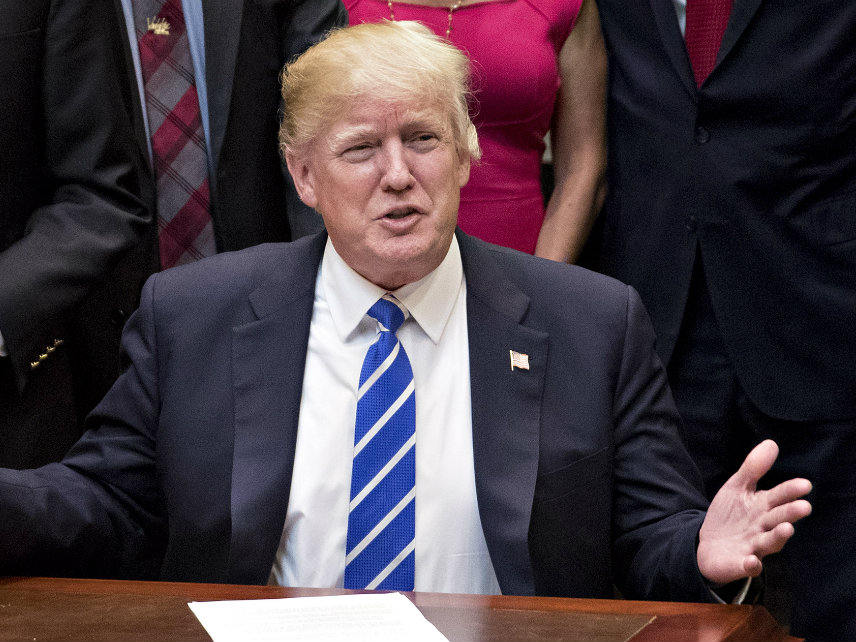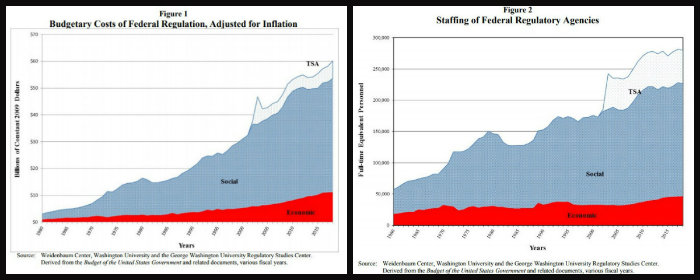Trump's Budget Hikes Regulatory Spending Twice as Fast as Obama's Final Year
Trump is cutting some regulatory costs, but overall spending and staffing levels will increase, thanks mostly to the Department of Homeland Security.

Despite promising to roll back the federal regulatory state, President Donald Trump's first budget proposal would increase regulatory spending by more than 3 percent—double the increase approved by Congress during Barack Obama's final year as president.
If Congress were to enact Trump's budget as written, the federal government's regulatory staff would fall by half of 1 percent, but the total amount of taxpayer money spent by regulatory agencies would climb to $69.4 billion. That's up from $65.9 billion in 2017 and $63.7 billion in 2016, according to researchers at the Weidenbaum Center on the Economy, Government, and Public Policy at Washington University in St. Louis and the George Washington University Regulatory Studies Center in Washington, D.C.
Researchers from the two schools have been tracking the so-called "regulatory budget" since 1959. Regulatory spending by the federal government has increased 20-fold during that time.
This year's report examines 77 different federal agencies involved in regulating social affairs (things like the National Highway Traffic Safety Administration or the Food and Drug Administration) or economic affairs (the Securities and Exchange Commission, the Consumer Financial Protection Bureau, and the like).
The overall increase in regulatory agency spending masks some areas where the Trump administration has proposed cuts. The Environmental Protection Agency, for example, would face $4.1 billion in spending cuts and would lose an estimated 4,000 employees under Trump's budget. In other areas, the administration has taken direct steps to reduce regulations, as when it worked with Congress to kill several major Obama-era regulations with the Congressional Review Act. Trump's appointees at the Department of Education, the Federal Communications Commission, and elsewhere have indicated a desire to wipe more regulations off the books.
The Washington University/George Washington University report isn't counting the number of regulations, though. Instead, it's counting the actual cost of enforcement, in terms of taxpayer money spent and government employees hired.
Under that calculus, Trump's regulatory cuts are being offset by the president's plan to spend more money and hire more people to regulate immigration. "Regulators who focus on immigration, such as those at the Coast Guard, Immigration and Customs Emforcement, Customs and Border Patrol, and the Transportation Security Administration are budgeted for increases of around 10 percent or more next year," Susan Dudley, one of the report's authors, noted in a summary posted at Forbes.
Rather than cutting the regulatory state, then, Trump's first budget plan is better understood as a shifting of regulatory priorities—a shift in which the increases overwhelm the cuts.
The biggest increases are within the Department of Homeland Security, where regulatory agencies would see a 13.7 percent increase ($4.1 billion, equal to the cuts at the EPA) this year, followed by a planned 5.9 percent increase next year. Staffing at DHS is expected to grow by more than 2,300 people under Trump's budget.

One big caveat: All of this assumes that the budget eventually adopted by Congress will include the cuts proposed by the White House. That is, to put it mildly, far from guaranteed.
Trump's presidency has been unique in many ways, but his regulatory budget follows a long-term trend. According to the report, Obama increased federal regulatory spending by 13 percent ($6.8 billion) during his eight years in office, while staff levels increased by 7 percent. George W. Bush set a faster pace, hiking regulatory spending from about $25 billion in 2000 to more than $47 billion by 2008, an increase largely driven by the creation of the Department of Homeland Security and the TSA during his presidency.
When Trump accepted the Republican nomination in Cleveland last year, he promised that "we are going to deal with the issue of regulation, one of the greatest job-killers of them all." In some ways he's done that. But his budget still fits snugly into a 60-plus-year trend of a federal government that spends more of your money to stick its nose into more of your business.
Editor's Note: As of February 29, 2024, commenting privileges on reason.com posts are limited to Reason Plus subscribers. Past commenters are grandfathered in for a temporary period. Subscribe here to preserve your ability to comment. Your Reason Plus subscription also gives you an ad-free version of reason.com, along with full access to the digital edition and archives of Reason magazine. We request that comments be civil and on-topic. We do not moderate or assume any responsibility for comments, which are owned by the readers who post them. Comments do not represent the views of reason.com or Reason Foundation. We reserve the right to delete any comment and ban commenters for any reason at any time. Comments may only be edited within 5 minutes of posting. Report abuses.
Please to post comments


[turns MAGA cap around backwards]
[Begins rapping to Good Vibrations]
C'mon, c'mon - feel it, feel it.
Also, "Wildside" may be the least libertarian song ever, because it's an anti-drug song that samples Lou Reed.
More like Marxist Marx.
[Puts MAGA underwear on inside out]
The worst part is you already had skidmarks on the outside.
I tell you, that's the last time I am letting you sit in my lap, Hugh.
I don't think anyone truly believes drug enforcement or immigration enforcement count as regulation. That word is only meant for things like Wall Street or wetlands. RECALCULATE.
I speak for all Libertarians when I say that all law enforcement should have its budget doubled every year.
I don't find much value in the vs. Obama metric.
I think such comparisons can be useful as a way to frame how much is actually being spent. I agree its not useful at all for arguing the value of such spending though.
There are some questions I have with this.
One, we can view regulation as one bulk sum, but is that fair? For instance, does new FDA regulations have as much impact as new ATF regulation? Does the aggregation lose valuable nuance?
Two, if the number of regulation on file decreases but the amount of spending increases how does this impact people as a whole? Does this lead to more onerous on citizens or does it amount to more regulators twiddling their thumbs? Basically pissing away money without negatively impacting the overall economy?
FFS Reason. What's the point of posting pics of graphs too small to read? Learn to link a full sized version popup.
2 thoughts:
1) Trump isn't a budget hawk - this is my shocked face. Also, based on his claims about how he was going to build walls, strengthen the military, and engage in massive capital projects, even ardent Trumpistas shouldn't be surprised that his budget isn't exactly penny pinching.
2) It's been a long time since I sat in a high school civics class, but I seem to recall the teacher writing Congress Spends the Money in big letters on the chalkboard.
When did people stop getting Civics course? I know I didn't have them.
Hey, TLAH didn't storm the beaches of Normandy so you could make your little age about him.
TLAH will always mean The Last Action Hero to me. So I would appreciate not appropriating that acronym for other usage.
You're so stupid.
The Last American Hero was a good movie with an awesome theme song, while Last Action Hero - a bad movie despite having two amazing screenwriters - is not called The Last Action Hero.
Get it together.
I added the The of my own volition because I consider the movie to be definitive. Also, THE Last Action Hero is good as fuck. I stand against the authority of film critics and will stand by that movie and the fact that Megadeth wrote a song for it.
Also, THE Last Action Hero is good as fuck
Maybe as a cramped backseat teenage fuck*, person who has surpassed Zeb for epitomizing the worst taste in things.
*Yes, my nickname in college.
That's it. I've taken your shit long enough. YOU ARE BANNED FROM REASON.
The biggest increases are within the Department of Homeland Security, where regulatory agencies would see a 13.7 percent increase ($4.1 billion, equal to the cuts at the EPA) this year, followed by a planned 5.9 percent increase next year. Staffing at DHS is expected to grow by more than 2,300 people under Trump's budget.
We do need to increase the staff in our most important agencies.
So John's getting a raise?
deserveedy so. nitwit.
You really are the stupedest commenter on Hit and Runt. Im sorry but you are.
Hit and Runt was my nickname when I was getting a particular fetish out of my system.
Those millions upon millions of Mexican rapists are not going to catch themselves...
Plus, ENB has written how DHS is arresting prostitutes, so, yeah, that will be nice, too.
They're rapists as well. I'm just trying to give them money and then they attempt despicable things against me.
And illegals immigrants who have not raped but have broken federal law nonetheless.
"In other areas, the administration has taken direct steps to reduce regulations, as when it worked with Congress to kill several major Obama-era regulations with the Congressional Review Act. Trump's appointees at the Department of Education, the Federal Communications Commission, and elsewhere have indicated a desire to wipe more regulations off the books."
Nice to see some people at Reason willing to admit this.
like Todd responded I'm blown away that a single mom able to get paid $480000 in four weeks on the computer . go to the website????
I was going to post something rude, offensive and just plane stupid, but then I saw other people beat me to the punch.
They should repeal and replace the Department of Homeland Security are just make it so small it can be drowned in a bathtub.